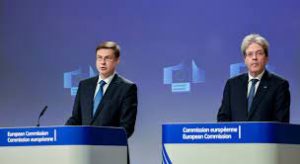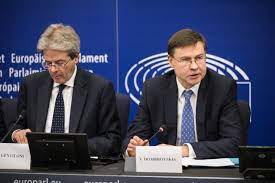
What is the Commission presenting today?
The European Commission is presenting a Communication relaunching the public debate on the review of the EU economic governance framework, taking stock of the changed circumstances following the COVID-19 crisis.
With this Communication, the Commission invites all stakeholders to reflect on the functioning of the economic governance and present their views on how to enhance its effectiveness.
The aim of the public debate is to build a broad-based consensus on the way forward well in time for 2023.
Why is the Commission relaunching the public debate on the future of the economic governance framework now?
In February 2020, the Commission presented a Communication on the EU economic governance review, which highlighted a number of strengths and weaknesses in the economic governance framework and opened a public debate on the basis of its findings.
That reflection was put on hold shortly afterwards due to the need to focus on the immediate challenges posed by the COVID-19 pandemic. The Commission pledged at the time to relaunch the debate once the economic recovery took hold.
Almost two years after the Commission published its earlier findings, the main conclusions remain valid and relevant. The relaunched debate should combine these with the lessons drawn from the crisis. This will allow for reflection on an economic governance framework that can fully support Member States to tackle post-COVID macroeconomic challenges.
What impact has the COVID-19 pandemic had on the EU’s economy?
The COVID-19 pandemic resulted in an unprecedented contraction in EU economic activity in 2020. Due to the severe recession and the necessary, forceful policy response, deficits and debt ratios increased in all Member States and are expected to remain markedly above pre-pandemic levels in 2021 and 2022. In terms of labour market, the crisis has had a severe impact on certain economic sectors, although overall employment contracted mildly thanks to the policy responses at national and EU levels.
In general, the crisis has aggravated a number of pre-existing vulnerabilities. Internal imbalances related to high government and private debt have increased. Pre-pandemic dynamic house price trends have persisted and mortgage debt has continued to grow significantly in some countries. Current account deficits have widened in those countries most dependent on tourism revenues. At the same time, the correction of current account surpluses has stalled. Moving forward, new imbalances may emerge as a result of structural transformations accelerated by the COVID-19 crisis.
Following this marked economic contraction, the recovery is taking hold. Thanks to strong coordinated policy support, a successful vaccination campaign and the ensuing gradual easing of pandemic-related restrictions, growth resumed strongly in spring 2021. Economic developments over the summer suggest that the third quarter of 2021 will register continued robust growth, not least thanks to the re-opening of our societies and resumption of travel. Economic activity is expected to remain sustained for several quarters ahead, pushing the EU economy from recovery into expansion. At least 19 Member States are expected to reach their 2019 levels of GDP this year, while all others are expected to reach that level in the course of next year.

How did the EU attempt to cushion the economic impact of the COVID-19 pandemic?
The exceptionally large and coordinated policy response has been successful in significantly mitigating the economic damage of the COVID-19 crisis in Europe. The response to the crisis was carried out quickly and forcefully at both the national and EU levels.
This response included measures such as the activation of the general escape clause of the Stability and Growth Pact, the adoption of the State Aid Temporary Framework, the Corona Response Investment Initiatives, and establishing new emergency tools such as SURE, the instrument for temporary support to mitigate unemployment risks in an emergency. This allowed Member States to provide an unprecedented amount of fiscal support. Monetary policy complemented fiscal policy efforts.
As a result of this joint and coordinated policy response, the impact of the COVID-19 crisis on unemployment, economic and social divergences, corporate insolvencies, and non-performing loans has been far less severe than originally anticipated.
In the coming years, the firepower of the new Multi-annual Financial Framework and NextGenerationEU, particularly through the Recovery and Resilience Facility (RRF), will help Member States achieve a sustainable recovery, make their economies and societies more resilient and support the green and digital transitions.
What are the implications of the COVID-19 pandemic on the future of the economic governance framework?
The COVID-19 crisis has further underlined the challenges facing the economic governance framework and made several of them even more relevant.
Public debt ratios have increased further, highlighting the challenge of a gradual, sustained and growth-friendly reduction to prudent debt levels.
Public investment will need to be sustained at high levels for years to come, highlighting the importance of a good composition of public finances to ensure sustainable and inclusive growth.
Counter-cyclical discretionary fiscal policy, together with temporary EU fiscal support tools, has proved highly effective in cushioning the impact of the COVID-19 crisis in a timely and efficient manner. This highlights the importance of creating fiscal room in normal times to allow for room for deployment in times of crisis.
The effective policy response has underscored the importance of strong policy coordination, including between different policy and funding tools, and between the EU and national levels.
The rapid evolution of the crisis illustrated the difficulties associated with using indicators that are not observable and attempting to design rules that seek to cater for all possible circumstances.
Several sources of pre-crisis macroeconomic imbalances have increased and new ones are emerging, highlighting the importance of preventing and addressing divergences in a timely way.
The relaunched review should complement the Commission’s earlier findings, as set out in the February 2020 Communication, with these new lessons learnt from the COVID-19 crisis.
What are the lessons learned from the Recovery and Resilience Facility?
The review of the economic governance framework could draw useful lessons from the successful EU policy response to the COVID-19 crisis, in particular the RRF framework and its governance.
Member States designed their national recovery and resilience plans, covering investment and reforms, taking into account country-specific circumstances and policy priorities. On the basis of those plans, the Commission engaged in constructive and intense policy dialogues with Member States, leading to an improved mutual understanding of the challenges and policy priorities at both national and EU levels.
The RRF’s transparent and commitment-based approach to policy coordination provides a good example of how to build trust and national ownership. Taking into account the lessons from the RRF, the economic governance review should consider how national ownership, mutual trust, the effective delivery of the framework on its key objectives, and the interplay between economic and fiscal dimensions can be best ensured.

What are the key issues that the public debate will discuss?
There are eleven key issues for the public debate, as reflected in the updated online survey. Taking stock of the pre-existing vulnerabilities and the new challenges highlighted by the crisis, the issues for public debate have been complemented by two additional questions (no. 6 and 11), while another has been slightly reformulated (no. 9).
The questions are as follows:
- How can the framework be improved to ensure sustainable public finances in all Member States and to help eliminate existing macroeconomic imbalances and avoid new ones arising?
- How can the framework ensure responsible fiscal policies that safeguard long-term sustainability, while allowing for short-term macroeconomic stabilisation?
- How can the framework incentivise Member States to undertake the key reforms and investments needed to deliver on the Green Deal and help tackle today’s and tomorrow’s economic, social, and environmental challenges such as the twin transition while preserving safeguards against risks to debt sustainability?
- How can one simplify the EU framework and improve the transparency of its implementation?
- How can surveillance focus on the Member States with more pressing policy challenges and ensure quality dialogue and engagement?
- In what respects can the design, governance and operation of the RRF provide useful insights in terms of economic governance through improved ownership, mutual trust, enforcement and interplay between the economic, employment and fiscal dimensions?
- Is there scope to strengthen national fiscal frameworks and improve their interaction with the EU fiscal framework?
- How can the framework ensure effective enforcement? What should be the role of financial sanctions, reputational costs and positive incentives?
- In light of the wide-ranging impact of the COVID-19 crisis and the new temporary policy tools that have been launched in response to it, how can the framework – including the Stability and Growth Pact, the Macroeconomic Imbalances Procedure and, more broadly, the European Semester – best ensure an adequate and coordinated policy response at the EU and national levels?
- How should the framework take into consideration the euro area dimension and the agenda towards deepening Economic and Monetary Union?
- Considering how the COVID-19 crisis has reshaped our economies, are there any other challenges that the economic governance framework should factor in beyond those identified so far?
Who will participate in the public debate?
The Commission looks forward to an inclusive debate with the European Parliament, the Council, the European Economic and Social Committee, the Committee of the Regions, the European Central Bank, national central banks, national governments and parliaments as well as a wide range of stakeholders, including social partners, academia, independent fiscal institutions and national productivity boards.
How will the public debate be structured?
The debate will take place through various fora, including dedicated meetings, workshops and an online survey. The online survey has been relaunched today and citizens, organisations and public authorities are invited to submit their contributions by 31 December 2021.
The Commission’s dedicated economic governance website will serve as a hub for information on the various listening events that the Commission will organise. The Commission will also evaluate information and feedback gathered during other events organised by stakeholders across the EU.

Will the Commission come forward with new proposals on the basis of the outcome of this public debate?
The next step is to engage openly with interested parties to seek their views on how to strengthen the economic governance framework in light of the pre-existing vulnerabilities and new challenges. The Commission will consider all views expressed during the public debate.
It will, in the first quarter of 2022, provide guidance for fiscal policy for the period ahead, with the purpose of facilitating the coordination of fiscal policies and the preparation of Member States’ Stability and Convergence Programmes. The guidance will reflect the global economic situation, the specific situation of each Member State and the discussion on the economic governance framework.
The Commission will provide orientations on possible changes to the economic governance framework with the objective of achieving a broad-based consensus on the way forward well in time for 2023.

















